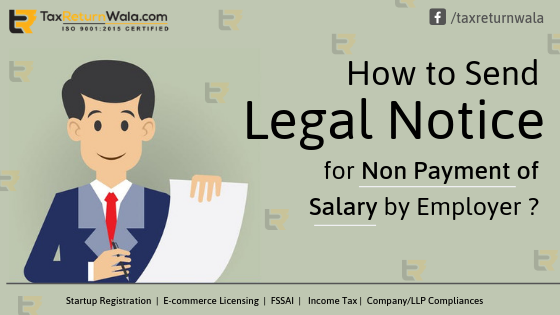How to send a legal notice for non-payment of Salary
Employees in India do lack knowledge of rights available to them through the constitution and various statutory laws. Non-payment or delayed payment of salary by the employer is one of the most common problems faced by employees during there tenure of employment. The problem is more severe when they request for there last salary payment or payment of unavailed perks pending with employer at the time of resignation or at the end of the employment contract.
To safeguard employees, the Indian legislature specifies for all possible remedies that can be availed to recover unpaid salary payments from employers.
To claim his return of benefit provided to the employer, an employee can draft a legal notice to the employer with due consultation of a legal advisory.
Requisites before placing a ‘Legal Notice for Salary to Employer ‘
Be sure you have the following before sending a legal notice to employer for payment of salary dues :
– Copy of employment contract
– Proof of unpaid salary and past salaries received (Bank Statement ).
– Appointment/Joining letter / Interview Letter
– Details of additional perks and benefits allowed.
How to Proceed?
- Find and hire a well approved legal delegate /lawyer /legal advisory having experience in dealing with employment issues and matters relating to labor laws.
- Get a legal notice prepared through him specifying details of employment terms and duration for which salary was not paid.
- Give a second look to the legal notice prepared, to assure accuracy and affirmation of all facts and figures stated.
- After all legal attestations and approvals, send the notice to the employer through registered post.
Note: It is always recommended to get the notice prepared within 90 days of default in the payment made by the employer.
What else an employee can do?
Employers on receipt of legal notice do believe that they have enough resources to pursue a suit against an employee demanding his due pay. Thus, the law disposes of various other remedies for the employee to directly proceed for strict action against the employer for non-payment of his salary dues. Some options to the employee available include :
- Going through an Arbitrator: Looking back at the terms of employment contract, an employee can sorta negotiation with the employer through an arbitrator, if an Arbitration clause or a way to resolve a matter between an employer was pre-stated in the employment An arbitration can mutually solve the dispute between both parties without actually going to the court.
- Seeking Assistance of Labour Commissioner: In case, there is no arbitration clause or the contract specifies no viewpoints on salary disputes, then the employee can even reach out to labor commission of the district to seek the help of the labor commissioner to help within its
- File a petition in labor court: With provisions of the Industrial Dispute Act 1947, an employee can even reach out to a labor court to demand they pay dues to the employer through a legal consultant.
- In the case of a company, the employee can even reach out to the Registrar of Companies, of the respective area to seek action against the company for non-payment of salary.
Also Read: Ways to Make Your Payroll Process Compliant & Error Free
FAQs
Q.What if the employer refuses to pay even after receipt of legal notice?
– After receipt of legal notice, no employer can deny responding to the legal notice based on the facts stated with pieces of evidence in reference including employment contract, payment terms, etc.
- What is the maximum period that an employer can withhold the salary of employees?.
– As defined in Payment of Wages Act, an employer (defined as per the act ) can withhold the salary of an employee-only up to a maximum period of 30 days or until he serves his due notice period or returns back the employer confidential documents/resources provided to an employee during his employment term.
2. Can a legal notice be sent for non-payment of bonus or EPF amount?
– Yes, an employee can legally sue an employer for non-payment of perks, bonuses, salary whether not paid in full or paid partially.
Get consultation on all legal matters related to payroll and labor laws.
Email us your concern at info@taxreturnwala.com


